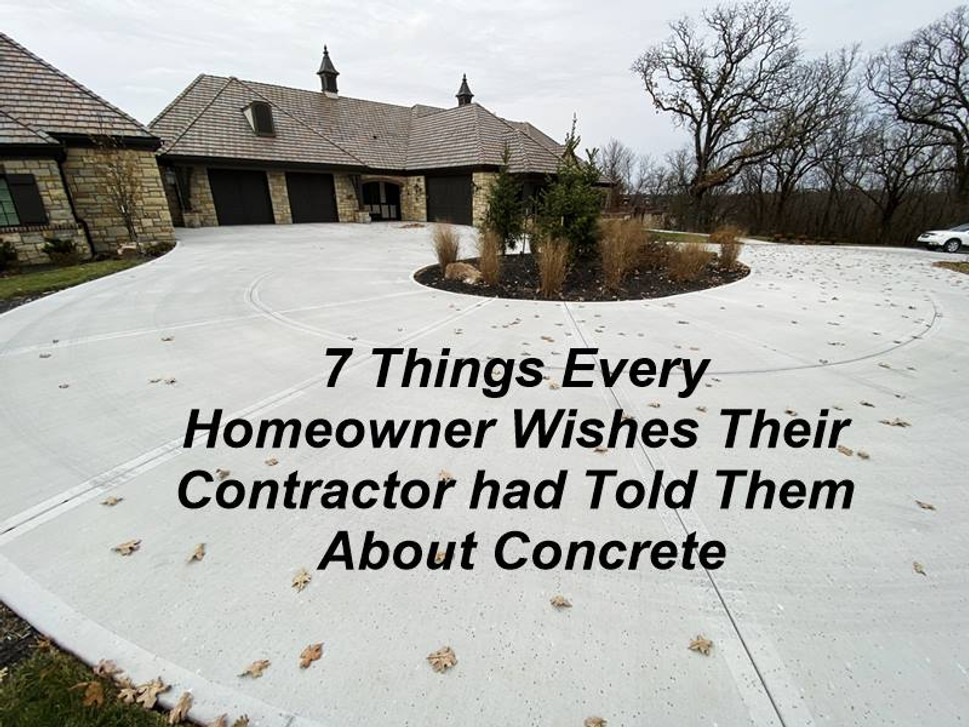I originally thought this was information that should be shared with brand-new homeowners and then I realized how many homeowners in general are never told these things and how badly we all need to know them. The list of things that homeowners are never told when they purchase a new home is much too long to explore in this blog so I have limited it to things that homeowners should know about their concrete.
1) Concrete needs to be taken care of. People frequently do not realize this until they wake up one morning and realize that their concrete driveway has turned to gravel seemingly overnight. Your builder and your concrete installer will not tell you this. Nor will they tell you how to maintain your concrete. Tip: Learn how to maintain your concrete and start immediately. Many people wait until the first sign of problems and then do something. Be proactive not reactive. Concrete Maintenance Tips
2) Concrete in new homes is NOT warrantied. Many people think that because the concrete driveway, walkways, patio, etc. are part of the price of the new home that it is covered by the warranty. It is NOT. I repeat - concrete is not covered under the warranty. New homes warranties are kind of like health insurance - just because your teeth, your eyes, and your ears are part of your body, it does not mean they are covered by insurance. Spring Inspection of Your Concrete
3) No one tells you how expensive it is to replace concrete - or what a hassle it is to get it replaced. The price of concrete is wrapped into the total price of the house so people do not realize that it will cost about $7.50 per square foot to tear out and replace a concrete driveway. For a 1,000 square foot driveway (typical in Johnson County, KS), this means that it will cost you about $7,500 to replace a driveway. Patios and garage floors could cost even more because of the difficulty in getting access to these areas. Stamped Concrete is usually double the cost of plain concrete to install. Repair or Replace your Driveway
4) Stamped and stained concrete will require expensive maintenance about every two years. If you are looking for a maintenance-free home, do not get stained or stamped concrete. Stained concrete gets its rich color and lustrous finish from topical sealers. And no matter how good a topical sealer is, it is vulnerable to scratches and other surface damage as well as vulnerable to the weather such as extreme sunshine, cold, freeze-thaw, etc. And don't put off the maintenance. Just like other household maintenance, the longer you wait, the more expensive the upkeep becomes. Stamped Concrete Requires Maintenance
5) Good preparation is one of the most critical parts of pouring sustainable concrete. The soil, the drainage, the temperature and the humidity are among factors that will determine if you have good concrete. Never pour concrete when it is too hot or too cold or when it is going to rain or snow. Not all Concrete is Make Equal
6) Many of the problems seen in concrete are created by poor finishing of the concrete. - Adding extra water as the concrete is finished reduces the strength of the concrete. Cheaper installers sometimes do not use rebar or do not put gravel under the concrete or they lay the rebar on the ground (it should be on chairs so that it is in the middle of the slab) or do not mix enough cement (the actual glue that holds gravel, sand and water together to make concrete). Or the slab can be too thin (such as 2" think when it should be 4" thick). Many people will tell you that concrete will crack and there is nothing that can be done - but that is not true. Proper installation and finishing is key to sustainable concrete. What Real People Say About Sealing Concrete
7) Cure and Seal is not a seal - it is a short life product designed to help the concrete cure properly. Many homeowners respond that they don't need to seal their concrete because the installer put on Cure and Seal. Sealing your concrete is imperative to protecting your concrete. Concrete sealers come in as many versions as you can imagine. In order to select the correct concrete sealer it is important to know what you want the sealer to do and to study the various chemistry of the sealers. Concrete Sealer Types - Part 1

